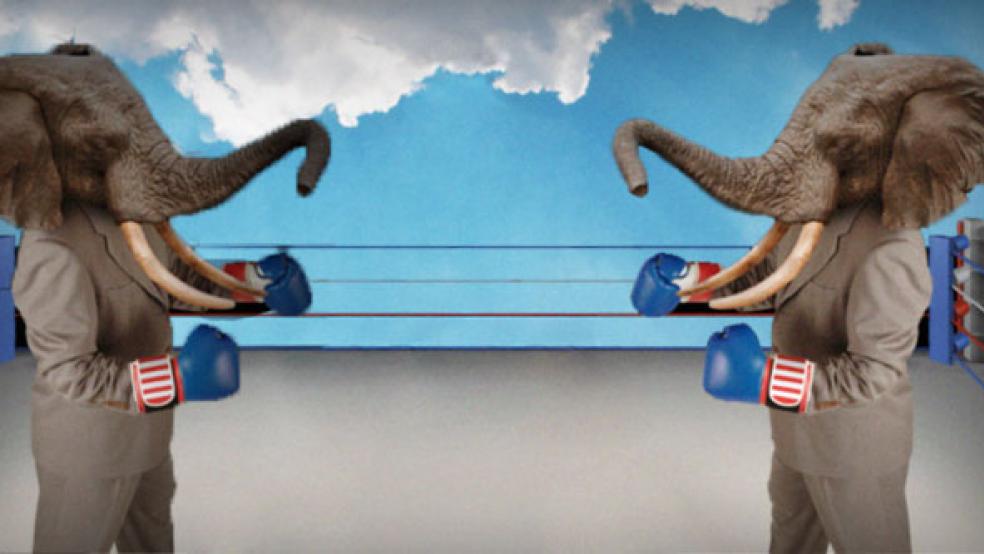Pennsylvania is looming as one of the real wildcards of the presidential season –in terms of the outcome of its upcoming presidential primary and the role its GOP delegates will ultimately play this summer at the national convention.
Pennsylvania has become the party-switching capital of the country, with roughly 100,000 Democrats and independents switching their party affiliation to Republican and 70,000 Republicans switching to Democratic ahead of next month’s primary.
Related: Why a Trump Candidacy Threatens the GOP Majority in Congress
While some of this unquestionably reflects strategic maneuvering by the two parties to help nominate who they perceive as their weakest general election foe, experts say a lot of it has to do with GOP presidential frontrunner Donald Trump’s widespread appeal among white, blue collar Democrats, particularly in Pittsburgh and other southwestern areas of the state.
Earlier this year, more than 20,000 Democrats in Massachusetts changed their party registration to Republican, largely to vote for Trump, according to some state election officials. Trump scored a major victory in Massachusetts in late February, surprising many who thought he would have trouble winning in a state with more moderate Republicans.
But the party switching there pales by comparison to the magnitude of what is taking place in Pennsylvania. Terry Madonna, a professor of political science at Franklin & Marshall College in Pennsylvania, said on Monday that “I don’t know when we’ve ever had” a situation in which 170,000 people shifted from one party to another or went from being an independent to a member of one or the other parties.
Trump has a good chance of winning narrowly in Pennsylvania, but that may not translate into a needed passel of delegates.
Related: Trump vs. Cruz Is Turning Into a Bare-Knuckled Bar Fight
That’s because the Pennsylvania GOP has one of the most permissive primary election laws regarding how national delegates must vote on the first ballot at the convention this summer. Unlike most other states, 54 of the 71 national delegates elected in Pennsylvania – three from each of 18 congressional districts – are not obliged to support the candidate who garners the most votes statewide in the April 26 primary.
That means if Trump beats Sen. Ted Cruz of Texas and Ohio Gov. John Kasich of Ohio in the primary contest, three quarters of the 71 total delegates chosen could vote for Cruz or Kasich on the first ballot if they see fit.
Trump narrowly leads Kasich, 33 percent to 30 percent, in a new Franklin and Marshall College poll, while Cruz trails with just 20 percent. In the Democratic contest, meanwhile, former Secretary of State Hillary Clinton holds a substantial lead over her rival, Sen Bernie Sanders of Vermont, 53 percent to 28 percent.
"There are a reasonable number of scenarios where Pennsylvania becomes the center of a contested convention," Charlie Gerow, a Republican strategist and a candidate for national delegate, told The Morning Call newspaper in Allentown.
Related: The Five Most Endangered Senate Republicans
“Pennsylvania is a big wild card in the Republican process,” added Kyle Kondik, a University of Virginia political expert in an email today. “Most of the delegates will go to the convention unbound and may be more inclined to back an alternative to Trump.”
As for all the party-switching going on, Kondik said, “Republican presidential voters who have been registered as Democrats for years finally decided to take the plunge and become an actual Republican.” Many states, like Kentucky and West Virginia, have many more registered Democrats than Republicans, “even though those states are reliably Republican in presidential elections,” Kondik explained. “Also, voters just have more interest in the Republican primary this year and are choosing to vote in it instead of the Democratic primary.
In short, Pennsylvania could end up playing an outsized role in the selection of the GOP nominee. While 17 of the 71 national delegates will be bound by the outcome of the statewide beauty contest, the remainder will be free to vote as they see fit.
Related: Trump Might Win the Nomination, but Cruz Won the GOP
Trump is likely to win the nomination and has so far collected 739 of the 1,237 delegates he will need to prevail at the convention. However, Cruz and Kasich – with the backing of more establishment Republican leaders -- are aiming to deny him the crown.
A fight by Trump, Kasich and Cruz over the allegiance of the vast majority of Pennsylvania delegates could be intense in what already has become a dirty and nasty GOP presidential campaign.
Madonna recalled that former President Gerald Ford was just 150 unpledged delegates shy of the majority he needed to win the nomination over Ronald Reagan at the 1976 GOP convention. Ford ultimately prevailed on the first ballot after considerable arm-twisting.
“They were negotiating with the delegates for trips on the presidential yacht, visits to the White House; they were doing everything,” he said. “So I think you’re going to see a lot of wooing this time.”
Related: For Now, Democrats Savor a Clinton-Trump Matchup this Fall
We are already seeing not only wooing but hardball politics to try to nail down delegate allegiance. Over the weekend, Trump threatened to sue Cruz’s campaign for picking off 10 more of the 41 national delegates from Louisiana than he was technically entitled to after Trump won the popular vote in the March 5 primary.
“Just to show you how unfair Republican primary politics can be, I won the State of Louisiana and get less delegates than Cruz-Lawsuit coming,” Trump tweeted on Sunday.





